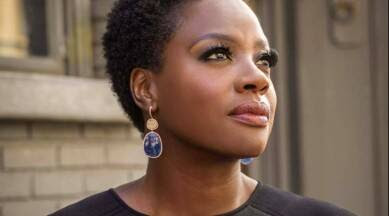The Oscar-winning actor says '' Finding Me '' her new memoir, '' brought me to a very powerful realization. And that is that the past no longer exists. It has no power to hurt me anymore.''
.- What books are on your night stand?
''Atlas of the Heart'' by Brene Brown.
.- What's the last great book you read?
The last great book I read was Roxane Gay's '' Hunger. '' Honest, painful, smart, transparent, authentic. It was everything. It took me to school, shifted me. Also, I admire this level of bravery. The kind that requires you to put truth out there in a way that can celebrate or ostracize you.
Man, it's beautiful to witness that kind of courage.
.- What's your favorite book no one else has heard of?
''Kaffir Boy,'' by Mark Mathabane. He is a South African writer who writes about growing up in apartheid South African link. It is one of the greatest memoirs I've read. It is both educational and heartbreaking.
Kaffir is a derogatory name for Black people in South Africa. His childhood was one where you were absolutely certain he would not make it. And somehow, he does. It's that magic that happens in the midst of the storm of life that is activated by hope and belief. It's a story that mirrored, on a larger scale, my own. Mathabane made me feel less alone.
.- Which writers - novelists, playwrights, critics, journalists, poets - working today do you admire most?
Roxane Gay, Brene Brown, Bryan Stevenson, Tarana Burke, Anne Lamott. All progressive fighters who have radicalized truth. They move life forward.
They all challenge us to lean into hard conversations as a way to establish real connection. Personally they have helped me to have the language and awareness to identify my ''feelings.''
Truthsayers, warriors, game changers - important, all of them.
.- You recorded the audiobook versions of your memoirs, ''Finding Me.'' What was that experience like for you? How was it different from the acting work you've done?
Recording the audio version of ''Finding Me'' was a very vulnerable experience. I felt I was living through those moments with every word I spoke. It made me question how I remember things. It also made me celebrate what I did remember and what I was able to express.
More importantly, it brought me to a very powerful realization. And that is that the past no longer exists. It has no power to hurt me anymore. It's different from my acting work because the only person I could hide behind was me. There was no other character.
.- What character from literature would you like to play?
Hedda Gabler, from the play by Henrik Ibsen. Hedda is the King Lear for women. When you meet her, you cannot figure her out. There's an angst, an unsettled quality that you might begin to judge.
In the end, you find that it's just a cover. It reminds me of life. Anyone you meet is a ''representative'' of themselves until they make themselves known. Then they make themselves known. Then they begin to make sense.
Hedda does not end well. The challenge is to make the audience understand her demise. It is a behemoth of a role and one that both frightens and excites me.
.- What's the best book that's been made into a great movie?
''To Kill a Mockingbird,'' with Gregory Peck and Brock Peters, and of course all of the Harry Potter movies and of course '' The Color People. ''The feeling I got when I read the books is comparable to the feeling I had when I watched the movies.
They retain the integrity of characters without falling prey to commercialism.
.- Do you count any books as guilty pleasure?
Absolutely my guilty pleasure books were the ''Twilight'' saga. I think I consumed all of them within a few days and it was pure, unbridled entertainment. I did it to feel closer to my niece, but I ended up enjoying them myself.
The World Students Society thanks The New York Times.

.png)


0 comments:
Post a Comment
Grace A Comment!